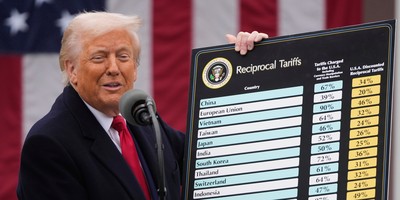Gov. Scott Walker's victory in the Wisconsin recall election this week was no surprise to anyone but Big Labor. Unions were furious when Walker and the Republican-controlled legislature cut back their right to bargain on anything beyond wages. Democratic legislators fled the state for several weeks in 2011 in order to try to prevent a final vote from taking place. Demonstrators took over the state capitol, and when that didn't work, unions and left-leaning groups gathered signatures to force a recall vote.
The national Democratic Party initially saw what was happening in Wisconsin as a popular revolt against Republican excesses and a key to preventing Republicans from building on their success in the 2010 congressional and gubernatorial elections. But as time for the recall neared, even party hacks were nervous. Still, organized labor pressed on, sure that they could count on Democrats, young people, minorities, and -- especially -- union households to turn out in greater numbers and vote to kick out Walker.
But exit polls from Tuesday's election show that unions were wrong in most of their predictions. Their candidate, Milwaukee Mayor Tom Burnett, won the votes of most Democrats (91 percent), young people (51 percent), and blacks (94 percent), but those voters were not as enthusiastic as Walker's base of Republicans, those over 30, and suburbanites and small-town voters. Turnout was historic for a governor's race in the state -- almost 60 percent -- but those committed to keeping Walker still exceeded those who wanted to give him the boot. Walker actually won a larger percentage of the vote in the recall election than he had initially in 2010.
Most devastating to the unions' ambitions, however, was that union households deserted labor's choice in droves. Nearly 4 in 10 union households voted to keep Walker in the governor's mansion, despite unprecedented pressure by union operatives who tried to get union members and their families to view Walker's efforts as a war on unions.
Recommended
Big Labor failed because even some union members recognize that public employees' benefits are way out of line in their state. Until Walker's reform passed, many public employees in Wisconsin contributed little or nothing to their pension and health plans. Walker instituted reforms that included mandatory employee contributions to pension plans -- 5.8 percent in 2011 -- as well as forcing some public employees to share a larger, but hardly excessive, share of their health care premiums. But these demands seemed reasonable to most working men and women, who are used to making such contributions already, even union members.
The real problem for the unions, however, was that Walker's reforms deprived public employee unions from having union dues deducted automatically from covered employees' salaries. Under the old rules, teachers and other public employees who were covered by a union contract had dues taken directly out of their paychecks by their employers and handed over to the unions, without their having given affirmative consent. After the new law passed, public employees had to sign up to have their dues collected -- and many decided not to.
Public employee union membership in Wisconsin plummeted as a result. According to the Wall Street Journal, the American Federation of State, County, and Municipal Employees lost more than half its members statewide, from 62,818 members in March 2011 to only 28,745 in February 2012. Teachers unions were hard hit as well, with the American Federation of Teachers losing 6,000 of its 17,000 members in the last 15 months.
It's no wonder given these numbers that so many union households ended up deserting their union leaders on Election Day. The real lesson is that Big Labor can no longer count on marshaling its members to turn out and vote as union leaders direct. The labor movement has gotten fat and lazy on mandatory membership, employers' collecting union dues, and promising more than can be reasonably delivered, like fat pensions for life.
And public employee unions, which have been the only segment of organized labor that has grown in decades as private union membership dwindled to only 6.9 percent of the workforce, are now going to have to face the music as well. Unions can't count on their members, especially when those 'members' can choose not to belong.

























Join the conversation as a VIP Member